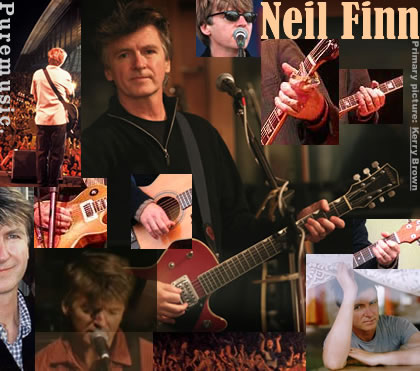
A Conversation with
Nick Seymour
(continued)
PM: I lack credits with these advance copies. Do you know all about songwriting credits for this record? Is that something you're completely conversant with?
NS: Yeah.
PM: Is it all Neil? Are there a couple of co-writes? Are you in on the writing?
NS: There are a couple of co-writes. The song "Silent House" is a co-write with the Dixie Chicks.
PM: Right, of course, they cut that.
NS: Yeah, the Dixie Chicks' track is also a collaboration with Johnny Marr from The Smiths, and that is a song called "Even a Child." And there is a single that we have out at the moment, "Don't Stop Now," Johnny Marr is playing on that track. He'd be recognized for his guitar playing.
PM: Yeah, he stands out.
NS: Ethan Johns produced the album, or the majority of the record.
PM: Ah.
NS: And then there was a subsequent four tracks that were recorded at RAK Studios in London with Steve Lillywhite producing.
PM: Great.
NS: And a producer is a collaborator, so there's a fairly consistent style through the record, in terms of the sounds. But there's a subtlety between those last four songs, subtle differences in the style of the last four songs.
PM: I would think that the personalities of Ethan Johns and Steve Lillywhite were pretty different, were they not, as studio personas?
NS: [laughs] They are totally different. There's one moment on "Even a Child," Neil was doing a guitar solo. And we listened back to the guitar solo--it was in the control room--and we listened back to the guitar solo, and we could hear this strange sound of magpies squealing right in the middle of the soundtrack. And we're like, "What--what did you play there? How--how is it making that noise?" And we suddenly--we soloed it, and realized it was Steve Lillywhite yelling, "Hooray!" And it was caught through the pickup of the guitar, and went onto tape.
[laughter]
NS: So he's the sort of guy that screams a lot when he's in the control room, screams "Hooray!" and "Fantastic!" and "Stop! Stop! That's horrible!"
[laughter]
NS: He really speaks his mind. He's a great, great producer. I mean, he's legendary, and he's legendary for a reason. Ethan Johns, on the other hand, is a very hands-on producer. He'll pick up an instrument and actually come into the studio and record with you.
PM: Ah. Yeah, and I think he's very tone-y on the board, and very good at getting sounds and all that, very engineering oriented.
NS: Yeah, extremely. I've never experienced a three-mic drum sound. Like he had three mics on the drum kit, and the total sound of the drums from three microphones was extraordinary.
PM: Three, total, is all he used?
NS: Yeah--actually four. There was a kick mic. I mean, he would have a kick drum mic, but the other microphones were ambient mics placed around the drums. If the drummer is playing to the sound of the room, that's the tone that should go to tape.
PM: Right.
NS: I think that's his justification, and it actually works.
PM: Wow.
NS: It works really well. He's a really clever guy.
PM: Yeah, and I hear a great guy.
NS: He comes from a tradition, though. His father is Glyn Johns, and his uncle is Andy Johns, also a huge engineer and producer. [Andy was Eddie Kramer's second engineer on classic Hendrix albums at the age of nineteen. His huge credits are for engineering, but he also produced many records of note.] I get the feeling that Ethan grew up with quite a competitive legacy from uncle and father driving him forward. continue
print (pdf) listen to clips puremusic home